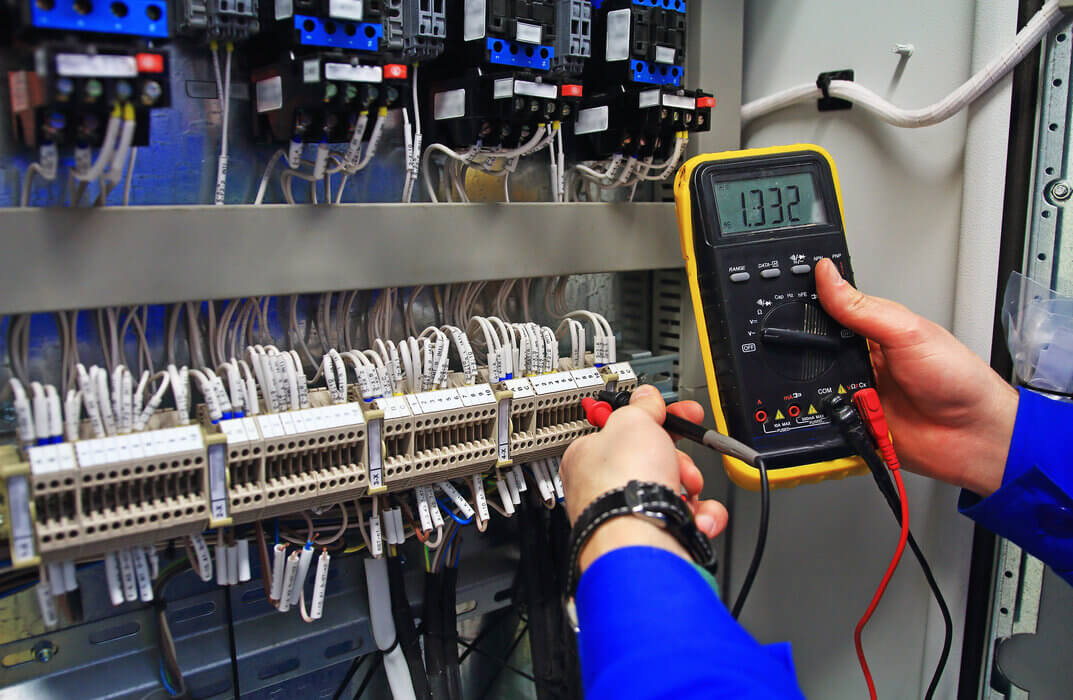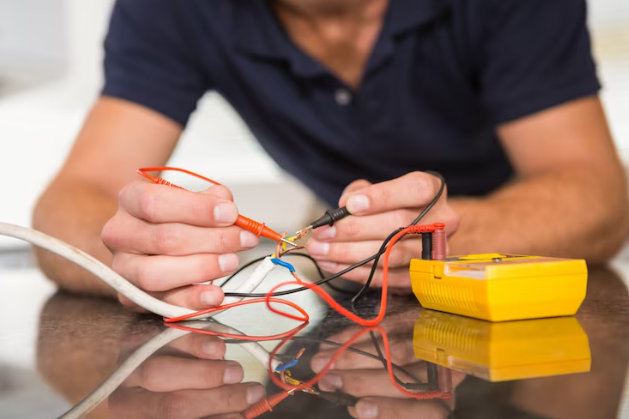| Unit 1: Introduction to Electric Machines |
|
Module 1- Introduction to Electric Machines |
|
00:03:00 |
|
Module 2- Types of Electric Machines and Principle of Electrical Generation |
|
00:09:00 |
| Unit 2: DC Machines |
|
Module 1- Importance and Construction of DC Machines |
|
00:26:00 |
|
Module 2- Armature Winding and EMF Equation |
|
00:40:00 |
|
Module 3-Solved Example 1 |
|
00:05:00 |
|
Module 4-Solved Example 2 |
|
00:04:00 |
|
Module 5-Solved Example 3 |
|
00:07:00 |
|
Module 6-Solved Example 4 |
|
00:06:00 |
|
Module 7-Separately Excited DC Machine |
|
00:21:00 |
|
Module 8-Shunt and Series DC Machines |
|
00:25:00 |
|
Module 9-Solved Example 1 on Separately Excited DC Machine |
|
00:07:00 |
|
Module 10-Solved Example 2 on Separately Excited DC Machine |
|
00:07:00 |
|
Module 11-Solved Example 3 on Shunt Generator |
|
00:04:00 |
|
Module 12-Solved Example 4 on Shunt Generator |
|
00:07:00 |
|
Module 13-Solved Example 5 on Series DC Generator |
|
00:06:00 |
|
Module 14-Types and Applications of Compound DC Motors |
|
00:07:00 |
|
Module 15- Torque-Speed Characteristics and Speed Control of Separately Excited DC Motor |
|
00:33:00 |
|
Module 16- Torque-Speed Characteristics of Series DC Motor |
|
00:08:00 |
|
Module 17-Solved Example 1 on Speed Control |
|
00:08:00 |
|
Module 18-Solved Example 2 on Speed Control |
|
00:06:00 |
|
Module 19- Starting of DC Machine |
|
00:14:00 |
|
Module 20- Armature Reaction in DC Machines |
|
00:10:00 |
|
Module 21-Losses in DC Machines |
|
00:04:00 |
| Unit 3: Construction of Transformers |
|
Module 1- What is a Transformer |
|
00:02:00 |
|
Module 2- Importance of Transformer |
|
00:04:00 |
|
Module 3-Iron Core of Transformer |
|
00:04:00 |
|
Module 4- Magnetic Circuit Inside Transformer |
|
00:05:00 |
|
Module 5- Windings of Transformer |
|
00:03:00 |
|
Module 6- Why are Windings Made of Copper |
|
00:01:00 |
|
Module 7- Classification of Windings |
|
00:05:00 |
|
Module 8- Insulating Material and Transformer Oil |
|
00:02:00 |
|
Module 9- Conservator of Transformer |
|
00:03:00 |
|
Module 10- Breather of Transformer |
|
00:04:00 |
|
Module 11- Bushings of Transformer |
|
00:04:00 |
|
Module 12- Tap Changer of Transformer |
|
00:03:00 |
|
Module 13- Cooling Tubes of Transformer |
|
00:01:00 |
|
Module 14- Buchholz Relay of Transformer |
|
00:02:00 |
|
Module 15- Explosion Vent |
|
00:02:00 |
|
Module 16- Methods of Cooling |
|
00:03:00 |
|
Module 17-Types of Transformers |
|
00:03:00 |
|
Module 18- Power Transformer and Distribution Transformer |
|
00:05:00 |
|
Module 19- Single Phase Core Type Transformer |
|
00:04:00 |
|
Module 20-Single Phase Shell Type Transformer |
|
00:05:00 |
|
Module 21- 3 Phase Core Type |
|
00:02:00 |
|
Module 22- 3 Phase Shell Type |
|
00:01:00 |
|
Module 23- Comparison between Shell and Core CSA |
|
00:01:00 |
|
Module 24- Comparison between Shell and Core Type |
|
00:01:00 |
|
Module 25- Notes |
|
00:03:00 |
|
Module 26-Video Explaining The Components in 3D and Real Life |
|
00:05:00 |
| Unit 4: Fundamentals of Magnetic Circuits |
|
Module 1- Introduction to Magnetic Circuits |
|
00:02:00 |
|
Module 2- Induced Emf and Current |
|
00:04:00 |
|
Module 3- Ampere Right Hand Rule |
|
00:04:00 |
|
Module 4- Magnetic Circuit and Important Definitions |
|
00:06:00 |
|
Module 5- Linear and Non Linear Materials |
|
00:03:00 |
|
Module 6-Flux Linkage and Reluctance |
|
00:04:00 |
|
Module 7- Analogy between Electric and Magnetic Circuits |
|
00:06:00 |
|
Module 8- Fringing Effect |
|
00:02:00 |
|
Module 9- Example 1 Magnetic Circuits |
|
00:07:00 |
|
Module 10- Example 2 |
|
00:03:00 |
|
Module 11- Example 3 |
|
00:06:00 |
|
Module 12- Application on Magnetic Circuit – Transformers |
|
00:04:00 |
| Unit 5: Theoretical Part on Transformers |
|
Module 1- Introduction to Transformers |
|
00:02:00 |
|
Module 2- Construction of Transformer |
|
00:02:00 |
|
Module 3-Theory of Operation |
|
00:04:00 |
|
Module 4- Ideal Transformer |
|
00:05:00 |
|
Module 5-Non Ideal Transformer |
|
00:02:00 |
|
Module 6- Effect of Loading on Transformer |
|
00:03:00 |
|
Module 7- Transformer Regulation |
|
00:03:00 |
|
Module 8- Transformer Losses |
|
00:03:00 |
|
Module 9- Transformer Efficiency |
|
00:05:00 |
|
Module 10- Transformer Rating |
|
00:02:00 |
|
Module 11- Question 1 |
|
00:01:00 |
|
Module 12- Question 2 |
|
00:02:00 |
|
Module 13- Question 3 |
|
00:01:00 |
|
Module 14- Example 1 |
|
00:01:00 |
|
Module 15- Voltage Relation of Transformer |
|
00:04:00 |
|
Module 16- Transformer Exact Equivalent Circuit |
|
00:06:00 |
|
Module 17- Concept of Refereeing |
|
00:04:00 |
|
Module 18- Approximate Equivalent Circuit |
|
00:02:00 |
| Unit 6: Synchronous Machines |
|
Module 1- Construction and Principle of Operation of Synchronous Generator |
|
00:29:00 |
|
Module 2- Principle of Operation of Synchronous Motor |
|
00:24:00 |
|
Module 3- Equivalent Circuit and Phasor Diagram of Non Salient Synchronous Machine |
|
00:29:00 |
|
Module 4-Solved Example 1 on Non Salient Machine |
|
00:05:00 |
|
Module 5-Solved Example 2 on Non Salient Machine |
|
00:11:00 |
|
Module 6-Solved Example 3 on Non Salient Machine |
|
00:07:00 |
|
Module 7- Solved Example 4 on Non Salient Machine |
|
00:04:00 |
|
Module 8-Solved Example 5 on Non Salient Machine |
|
00:07:00 |
|
Module 9-Solved Example 6 on Non Salient Machine |
|
00:03:00 |
|
Module 10- Equivalent Circuit and Phasor Diagram of Salient Synchronous Machine |
|
00:39:00 |
|
Module 11-Solved Example 1 on Salient Machine |
|
00:09:00 |
|
Module 12- Solved Example 2 on Salient Machine |
|
00:05:00 |
|
Module 13-Solved Example 3 on Salient Machine |
|
00:10:00 |
|
Module 14- Parallel Operation of Two Generators |
|
00:17:00 |
|
Module 15- Synchronization of Machine with Grid |
|
00:10:00 |
| Unit 7: Induction Machines |
|
Module 1- Construction and Theory of Operation of Induction Machines |
|
00:27:00 |
|
Module 2- Equivalent Circuit and Power Flow in Induction Motor |
|
00:23:00 |
|
Module 3- Torque-Speed Characteristics of Induction Motor |
|
00:20:00 |
|
Module 4- Solved Example 1 on Induction Motor |
|
00:08:00 |
|
Module 5-Solved Example 2 on Induction Motor |
|
00:06:00 |
|
Module 6-Solved Example 3 on Induction Motor |
|
00:06:00 |
|
Module 7-Solved Example 4 on Induction Motor |
|
00:18:00 |
|
Module 8-Solved Example 5 on Induction Motor |
|
00:13:00 |
|
Module 9- Methods of Speed Control of Induction Motor |
|
00:27:00 |
|
Module 10- Methods of Starting of Induction Motor |
|
00:21:00 |
|
Module 11-Solved Example on Motor Starter |
|
00:15:00 |
|
Module 12- Principle of Operation of Doubly Fed Induction Generator |
|
00:11:00 |
|
Module 13-Self Excited Induction Generator |
|
00:08:00 |

 14.3 Hours
14.3 Hours Course Certificate
Course Certificate

 39 Student
39 Student


